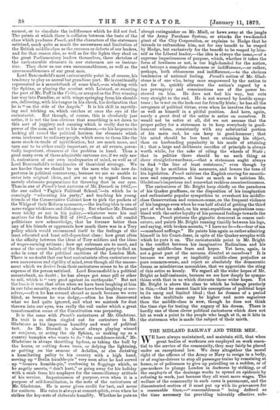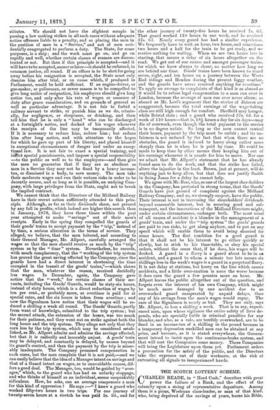THE MIDLAND RAILWAY AND '1'1:11,M MEN.
WE have always maintained, and maintain still, that when great bodies of workmen are employed on work essen- tial to the service of the community, they may fairly be placed under an exceptional law. We deny altogether the moral right of the officers of the Army or Navy to resign in a body, or of engine-drivers to stop all passenger trains by remaining at home, or of policemen to give up patrolling on a sudden, or of gas-makers to plunge London in darkness by striking, or of the employes of the drainage works to spread an epidemic by refusing to work, just because they all want more wages. The welfare of the community in such cases is paramount, and the discontented section of it must put up with its grievances for a reasonable time,—" reasonableness " being defined as the time necessary for providing tolerably effective_ sub- stitutes. We should not have the slightest scruple in passing a law making strikes in all such cases without adequate notice offences liable to a penalty, and so placing the men in the position of men in a " Service," and not of men acci- dentally congregated to perform a duty. The State, for some purposes, is a ship ; and the work must go on, and go on rapidly and well, whether certain classes of seamen are discon- tented or not. But then if this principle is accepted—and it will have to be accepted, sooner orlater—it should be enforced, in common justice, all round. If an officer is to be shot for going away before his resignation is accepted, the State must only dismiss him after trial, or on cause which, if produced in Parliament, would be held sufficient. If an engine-driver, or gas-maker, or policeman, or sewer mason is to be compelled to give long notice of resignation, his employers should give long notice too, and only alter his rate of wages or measure of duty after grave consideration, and on grounds of general as well as particular advantage. It is not fair to forbid a railway servant to strike, or punish him as we do, crimin- ally, for negligence, or sleepiness, or drinking, and then tell him that he is only a " hand " who can be discharged at a fortnight's notice, and docked of his wages whenever the receipts of the line may be temporarily affected. If it is necessary to reduce him, reduce him ; but reduce him after long notice, and with attention to the hopes for which he gave up part of his liberty, and placed himself in exceptional circumstances of danger and under an excep- tictnal law. It is not fair to exact a special training, and iAlict special punishments, and impose a special responsibility —to the public as well as to the employers—and then give the men no guarantee that if they are as obedient as men in a Service they may not be fined by a heavy income- tax, or dismissed in a body, to save money. The men take their moderate wages and run their serious risks in order to be decently secure, and so long as it is possible, an undying Com- pany, with large privileges from the State, ought not to break the implied contract.
We cannot think that the Directors of the Midland Railway have in their recent action sufficiently attended to this prin- ciple. Although, as far as their dividends show, not pressed by any fall in profits, which indeed are higher this month than in January, 1878, they have three times within the past year attempted to make "savings" out of their men's receipts. Early in the spring they compelled the guards of their goods' trains to accept payment by the " trip," instead of by time, a serious alteration in the terms of service. They alleged, we believe, that the men loitered, and according to their General Manager, Mr. Allport, carefully arranged the wages so that the men should receive as much by the "trip" system as by the " time " system. Nevertheless, he records, with much complacency, that the " working of the trip system has proved the great saving effected by the Company, since the guards have had a direct interest in shortening the time occupied in the transit of the goods' trains,"—which shows that the men, whatever the reason, received decidedly less wages. In December, again, the Company gave notice that the "week," for certain classes of their ser- vants, including the Goods' Guards, would be sixty-six hours, instead of sixty hours, which is a direct reduction of wages by ten per cent., or probably more, as overtime is paid for at special rates, and the six hours is taken from overtime ; and now the Signalmen have notice that their wages will be re- duced a shilling a week all round. The Goods' Guards, partly from want of knowledge, submitted to the trip system ; but the second attack, the extension of the hours, was too much for their patience, and they went out on strike against both the long hours and the trip system. They allege not only that they earn less by the trip system, which may be considered estab- lished, as Mr. Allport admits and admires the savings effected, but that it is radically and incurably unjust. A goods' train may be delayed, and constantly is delayed, by causes beyond its guard's control, and then the payment by the trip is miser- ably inadequate. The Company promised compensation in such cases, but the men complain that it is not paid,—and we can easily believe that the idea of a Manager intent on savings and that of a Guard intent on wages, as to unavoidable causes, dif- fers a good deal. The Manager, too, would be guided by " aver- ages," which, to the guard who has had an unlucky stoppage, and who thinks of himself as an individual, seems unspeakably ridiculous. How, he asks, can an average compensate a man for this kind of oppression ? He says :—" I knew a guard who worked fifty-two hours in two trips. For one journey of twenty-seven hours at a stretch he was paid 5s. 9d., and for the other journey of twenty-five hours he received 7s. 6d. That guard worked 110 hours in one week, and he received 37s. 6d. Nearly every guard has had a similar experience. We frequently have to wait an hour, two hours, and sometimes two hours and a half for the train to be got ready, and we receive nothing for waiting. When we are two hours late in starting, that means a delay of six hours altogether on the road. We get out of our course and amongst passenger trains, for which we have always to shunt, no matter how long we are behind our time. Goods' trains have been known to stand seven, eight, and ten hours on a journey between the West- End sidings and Hendon during the present foggy weather, and the guards have never received anything for overtime." To apply an average to complaints of that kind is as absurd as it would be to refuse legal compensation to a man run over in London, because the average of men run over never alters ; as absurd as Mr. Levi's argument that the stories of distress are exaggerated, because the total earnings of the wage-taking class are still high enough for comfort. Sheffield may hunger, while Bristol riots ; and a guard who received 37s. 6d. for a week of 110 hours—that is, 182 hours a day for six days—may die of overwork, even though the total payment to the service is in no degree unfair. So long as the men cannot control their hours, payment by the trip must be unfair ; and its un- fairness is not reduced by the fact that when there are no obstacles, the guard is induced to hurry along rather more sharply than he is when he is paid by time. He could be made to keep time by other means than keeping him out of his earnings whenever it is unsafe for him to move. Nor can we admit that Mr. Allport's statement that he has already found men to do the work, and that the strike has failed, alters the injustice in the least. Brown, just at present., will do anything just to keep alive, but that does not justify Smith in fining Jones for a delay he cannot help.
We agree with Mr. Bass, who, as one of the largest shareholders in the Company, has protested in strong terms, that the Goods' Guards have just ground of complaint against the Midland Railway Company, and so, we strongly suspect, have the public. Their interest is not in increasing the shareholders' dividends beyond reasonable interest, but in securing good and safe transport, and the innovations of the Midland Directors might, under certain circumstances, endanger both. The most usual of all causes of accident is a blunder in the management of a goods' train, and under the " trip system " the goods' guards are paid to run risks, to get along anyhow, and to put on any speed which will enable them to avoid being shunted for some hours. The first condition for a good guard is that it shall not be his interest to go either quickly or slowly, but to stick to his time-table, or obey his special orders, without the sense that, if he does, his wages will be docked. A guard in a flurry is a guard about to be in an accident, and a guard to whom a minute too late means six shillings less in the week's wages is a guard in a perpetual flurry. It is not delay at stations, but hurry on the line which causes accidents, and a little over-caution is none the worse because it does earn the guard a few pennies more an hour. Mr. Allport leaves the public altogether out of the question, and forgets even the interest of his own Company, which might be much more damaged by one accident due to an overworked guard exasperated by unpaid delays, than any of his savings from the men's wages would repay. The case of the Signalmen is nearly as bad. They are only, says Mr. Allport, to lose a shilling a week. That is to say, experi- enced men, upon whose vigilance the entire safety of lives de- pends, who are specially liable in criminal penalties for any blunder, and who, as a rule, are terribly overworked, are to be fined in an income-tax of a shilling in the pound because in a temporary depression unskilled men can be obtained at any price, and because, as it is stated everywhere, the Govern- ment intend to insist upon the continuous-brake system, and that will cost the Companies some money. These Companies will bring the Legislature upon them yet. Parliament orders a precaution for the safety of the public, and the Directors take the expenses out of their workmen, at the risk of entrusting all signals to inexperienced hands.







































 Previous page
Previous page